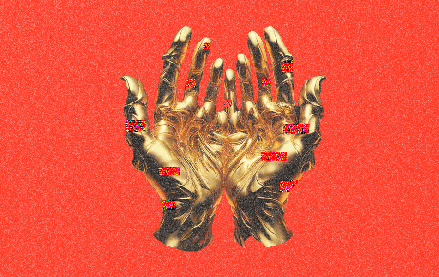How The Sandbox’s first virtual pride parade highlights the importance of diversity in the metaverse
In June, virtual platform The Sandbox will be the location of the first metaverse-native LGBTQ pride parade. The event is the brainchild of People of Crypto (POC) Lab, a new innovation hub focused on building diversity in Web3 spaces.
Users of all shapes, sizes and identities already spend their lives inside metaverse platforms — but the companies building these platforms and the virtual experiences inside them are not nearly as diverse, according to People of Crypto co-founder Simone Berry.
Berry and her co-founder Akbar Hamid — a Black woman and a gay Muslim man, respectively — first met about five years ago. Their bond was further solidified in 2021 at an NFT event in New York City, where they were among the few non-white attendees. “I was walking around, going, ‘I see no one,’” Berry said. “He was there with a client, and I was like, ‘I need to talk to you; I just need to see anyone.’ We met at a Starbucks, and over a cheese plate, we bonded and decided that we were going to make change.”
POC Lab is a joint effort between Berry and Hamid, and its first project is to build the “Center of Belonging,” a diversity and inclusivity center in The Sandbox that will act as a launching point for the first Metaverse Pride event.
The event, which kicks off in mid-June, is intended both to draw crypto-curious members of the LGBTQIA+ community into the metaverse and establish The Sandbox as a welcoming location for users of all identities. The centerpiece of the Pride space is a massive, rainbow-striped statue in the shape of a raised fist, which Hamid said will eventually be turned into a cross-platform NFT. POC Lab is also selling NFT avatars showcasing diverse perspectives, including avatars in hijabs and wheelchairs. The company also hopes to partner with LGBTQ advocacy organizations such as GLAAD and equity groups focused on the Black community such as 15 Percent Pledge for the event. “Of course, there’s the give-back component,” Hamid said. “We’re going to be writing charities into all of our smart contracts as well.”

If companies like POC Lab and The Sandbox want the diversity of their virtual spaces to match the demographics of the physical world, events like Metaverse Pride are much needed. At the moment, there is a healthy amount of skepticism about the metaverse among marginalized communities, particularly within the LGBTQ community, whose members already feel unprotected in Web2 spaces such as social media. The skepticism is fair: both Berry and Hamid were able to provide a laundry list of Web3 projects that ranged from the misguided to the blatantly racist.
“There was Meta Slaves; there was something about George Floyd; there have been projects where you can see the rarity scale of darker skins aren’t selling as high,” Berry said. “There are comments that the reason why things don’t sell is because there’s not a lot of Black people in the space, which is not true. There’s a lot of us, it’s just that we’re spread out.”
Despite this apprehension, Web3 experts in marginalized groups feel that the decentralized web could uplift their communities via blockchain technologies. “These are the communities that have been disenfranchised from the actual banking systems,” Hamid said. “So when you look at who’s adopting it fast, it’s these communities, because they don’t need permission.”
“We’ve had a financial system that has been built by men, for men — a small group of wealthy white men — and that system is continuing to serve that group. And we are at a very interesting inflection point at which there is permissionless, trustless technology that is giving the opportunity to create an entirely new financial system,” said Lisa Wang, founder of Bad Bitch Empire, an investment collective for women in Web3. “Now, just because the opportunity is there doesn’t mean it’s just naturally going to become fair and democratized and transparent and all these things. Because right now, it’s the same people flowing in, the same people taking advantage of this new system.”
Wang, a former hall-of-fame competitive gymnast-cum-tech founder and entrepreneur, started Bad Bitch Empire after being disappointed by the dearth of women in the boardrooms of prominent Web2 companies such as Uber and Amazon. As Web3 transitions from a speculative vision into a full-fledged industry, groups like hers and POC Lab are increasingly taking steps to ensure that diverse users have a say in the shape of the metaverse from the beginning.
While the primary purpose of the Metaverse Pride event is to uplift individual users, social-justice-oriented virtual events also create new opportunities for brands to engage with these communities in a way that might be more genuine and natural than their past attempts on Web2 social media.
“The last two years was the great awakening; we had a lot of kind of facade activities before that,” Hamid said. “In Web3, I think it’s really going to happen at the foundational level — and the response has been great so far.”
More in Marketing

With the rise of the chief AI officer, it’s time to examine ‘czar’ culture
Even if it’s a familiar pattern — hot new thing, new C-Suite exec to tackle said thing, a few years go by and that C-Suite position no longer exists as everyone is now doing said thing (or it was a fad that has since faded away) — does it make sense for businesses to continue to appoint new czars with every new trend?

Why Cava’s bid for brand awareness means prioritizing streaming ads
Fast-casual restaurant chain Cava has been in growth mode over the past year and is leaning into streaming ads in an effort to boost brand awareness.

A history of middle manager stress: The Return podcast, season 3, episode 1
In episode one, McKinsey partner Emily Field tells us more about why middle management is critically important to the workforce.








